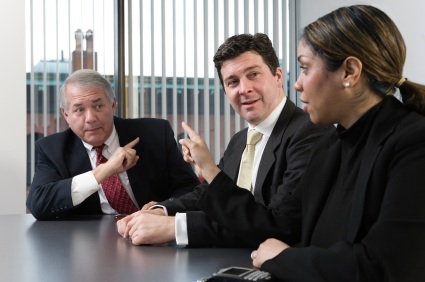Be Prepared for Your Customer’s Racially Offensive Statements – Here’s How!
Invariably it will happen no matter what minority group you represent. With all of the good customers in the world, there are some who just have no filter on what they should say. We could recognize their ignorance, but more importantly you should know how to deal with these situations. Always be prepared!
___________________________
Customers come from all walks of life, and certainly have their goods and bads, but we cannot live without them in the sales world. They are human, and with that in mind, are capable of saying things that are subject to translation, and sometimes downright wrong and insulting.
This post covers how you might react to those comments, or better yet, how you might better react to those comments. Remember, just as we stated in Black Sales Journal August 22,2011, Reacting to Improper Racial Comments from Co-workers and Black Sales Journal 8/29/2011, Reacting to Improper Racial Comments from Managers, which covered how you might react to statements from co-workers and from your manager, you have the right to react, I am just suggesting to you do so in a professional manner.
Just because someone is doing business with you does not mean that they can say things that are demeaning or even cruel without a formidable response.
Intent Does Count!
Before we get deep into this, I would like to point out that intent does count. I would like to explain that there are intentionally harmful racial comments that are made with malice, and racial comments that are made in ignorance. Although neither of these should be considered acceptable, and they both probably warrant a reply, the requisite responses might need to differ.
Statements that are made because one is ignorant or one is unenlightened obviously have the same effect, yet have less gravity than a statement meant to harm by some one who is rude and insensitive. Here are a couple of examples:
Statement A: During a business meeting your customer talked about safety in the area that his business is located. He says with a smile… “They say that one of your brothers pulled off the robbery of that fast food joint down the street last night.”
Statement B: During a dinner entertainment session, your buyer indicates she needs to terminate a Hispanic employee “who is still wet from the swim across because of the new immigration laws.”
Both statements are offensive, and both deserve a response. Which statement is, in your view, is the most racially charged? How would you react to each of these?
Always be calculated in your response and consider the intent. I will discuss how I would respond in a moment. First I want to acquaint you with a personal situation and how I handled it.
A Personal Example
When I was in sales, many of my customers were owners of trucking companies. This industry, like many others has people that say what is on their mind, and sometimes what is on their mind can be disparaging. In the instance that I am about to cite, I definitely responded incorrectly the first time, by not responding. When the second time came around, I think I definitely handled it in the correct manner.
I was on a call basically to deliver policies to the account and we got involved in a conversation about a driver who had generated a lower back workers compensation claim. Everyone knows that lower back claims can be subjective, and tend to linger for long periods.
During the call my customer indicated that we should investigate the claim of Ben T. He stated that he had reason to believe that Ben was malingering, and it was our job to get to the root of it and make sure that the claim was compensable, and that payments should be stopped until we knew for sure. He then said, “You have a good work ethic, and I wish all of your people had that same work ethic.”
I was a 26 year old sales professional and initially, my response was to say nothing other than that I would check it out. I thought I needed the client, and needed my money. I realized within minutes that my response was wrong. It kept me up at night for a little bit, and relived it several times.
When I returned to the customer location the following week, I explained to him the situation behind the back claim. This individual was going to undergo surgery and his claim was legitimate to our people. I then sat with him, looked him in the eye and said, “Respectfully Bob, I take offense to your comments last week about Ben T. and work ethic.” He developed a puzzled look and quickly said, “I did not mean to offend you Michael.” I then advised the following, “I know you did not mean to offend me, as we speak openly, yet you offended a whole community of people, of which I am one. It would have been the same as if I said that you are special, but most of your people are drunkards (Bob was Irish). It was frankly just wrong.”
A light bulb went on in Bob’s head. I could see it happen… enlightenment, that is. Bob said, “Point taken, but we Irish like to drink!” I quickly responded, “You do get my point, don’t you?” We smiled and wecompleted the meeting.
Back to Our Questions
Well, both situations are enough to of these statements are bothersome, and unfortunately situations like this happen in the workplace frequently.
Regarding Statement A: This is the least charged, as this person is attempting to refer to a felon as a ‘brother’ presumably because we often call Black people ‘brothers’ and ‘sisters’. It should not have been said but you would not have to use a nuclear bomb on this one. Your response should be simple and professional, “Respectfully, no one who would do that is a brother of mine.” Remember, this is a customer.
Regarding Statement B: This is a racially charged statement. You might hesitate to respond to it, yet the races are interchangeable in this case. If you do not respond, I suppose you would be waiting until this customer got around to taking a ‘shot’ at African Americans next. An improper remark against any group or religion is an attack on your diversity. Your response should be professional and impactful. Something like, “Kristin, honestly I take offense to that statement.” She knows it was wrong and if she is worth her salt she will not make another one like it.
Respect your principals. I am not saying that you should not work with a customer as much as you need to be true to yourself.
Always be true to yourself. Always be the professional.
Your comments are appreciated.
 July 7, 2014
|
Posted by Admin9!
July 7, 2014
|
Posted by Admin9!

 Categories:
Categories:  Tags:
Tags: 


Your Comments